Becoming a landlord can be a lucrative investment, but it also requires careful planning and execution. In this practical guide, we will discuss important factors to consider when managing your own rental property, from keeping detailed financial records to understanding local and state laws. Whether you’re a seasoned real estate investor or a first-time landlord, this guide will provide valuable insights to help you succeed in the rental property business.
Making the decision to become a landlord can be a profitable one. Under ideal circumstances as a landlord, you’ll be able to receive a positive cash flow on your property while it’s also appreciating in value. There can also be significant tax advantages.
But there’s a hefty amount of time and energy involved in managing your own rental property. There’s also a significant financial investment involved in purchasing and maintaining a property.
Let the following information guide you in your decision to become a landlord:
1. Remember that you’re operating a business. This means that you’ll need to keep profit in the front of your mind. It’s important to keep detailed records of your income and expenses. Keep those canceled checks, copies of bills, and receipts.
- An inexpensive ledger system is fine for tracking your financials. There are also various spreadsheet programs and dedicated accounting software that are excellent tools.
- Consider using a tax accountant, at least at first, to get you set up correctly. Joining a local real estate club can also be of great assistance.
2. You’ll have to pay taxes. Even though you need to pay taxes on the profits, there are also tax advantages available to property owners and landlords. Some of the common deductions include:
- Interest payments on the mortgage
- Advertising to find tenants
- Insurance premiums
- Property taxes
- Repairs and maintenance
- Tax Preparation
- Depreciation
3. There are local codes related to the structure itself. There are also local and state laws related to evictions, the handling of deposits, how much rents can be raised, and many other related issues.
- Your local government is likely to have copies of all the applicable laws available for you. The attorney general should have the required information regarding the applicable state laws.
- There are also many federal laws that pertain to tenant-landlord relationships. These primarily address discrimination as it relates to renting and advertising practices. Some of the laws are not applicable if the landlord lives at the property or if there are 4 units or less.
- Housing specified for senior citizens is also exempt from some requirements.
4. Consult a good attorney. It’s a good idea to have an attorney review your lease before the tenant signs to ensure you’re following the law. Attorneys are also useful during the eviction process. Your local real estate club likely endorses some attorneys that specialize in real estate matters.
- If you’re in doubt about any legal issue, it’s better to be safe than sorry.
5. A standard homeowner’s insurance policy will likely not apply. Your regular homeowner’s insurance policy is for owner-occupied homes, so you’ll need a policy specific to rentals. You might also require a separate policy if the home is vacant for an extended period of time.
6. Know your responsibilities. As a landlord, you must meet certain requirements. Be sure you’re aware of your state and local laws.
- Your building must comply with the local building codes.
- The property must be kept in livable condition.
- The utilities must be in sanitary and safe working order.
- You must provide functioning smoke detectors.
7. Consider a property management service. For about 10% of the rent, a property management company will find tenants, collect the rent, make repairs (at your cost), and handle nearly every other type of issue. If you’d rather spend your time finding additional rental properties to purchase, a management service can be a good idea.
Becoming a landlord is not to be taken lightly. Though it can be lucrative, it only takes one bad tenant to create a very challenging situation. Go into the business of being a landlord with your eyes open. There are many great books available on this topic and you can also find local landlords for guidance and advice.


